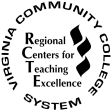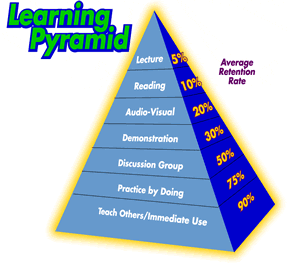 |
 |
 |
TNCC and the VCCS Tidewater Regional Center for Teaching Excellence
"2007 Adjuncts Academy: Excellence in All We Do"
Workshop I, Learner-Centered Education –
February 3rd
8:00 - 8:30 Continental breakfast and check-in, 2nd floor of Templin Hall, adjacent to the theater
8:30-10:30 Concurrent sessions: a veritable flood of useful information
Session A:
Characteristics of Community College Students and Engaging Them with Technology, room 917, Templin Hall
Presenters: Christy Hawkins and Barbara Hebert
This two-hour discussion combines two technology tools into one!
In the first half of the discussion, participants gain hands-on experience in online modules from 4faculty.org. The Virginia Community College System purchased access to these educational modules for all faculty and staff. While there are ten modules in the series, we will explore only one in today's workshop, entitled Characteristics of Community Colleges and Their Students. The aim of this module is to prepare the faculty member for the typical, diverse community college atmosphere. Objectives of the module include: describing the typical faculty characteristics at the community college, listing the characteristics of adjunct faculty at the community college and describing the characteristics of the community college student. At the completion of the module, participants will learn how to continue their progress with the 4faculty.org modules and earn a professional certificate and continuing education units.
Do you want to engage students? Make them want to come to class? Make them want to participate? In the second half of this discussion, we’ll demonstrate a range of uses for technology and multimedia in the classroom that are appropriate for all disciplines! Primary focus will be on using software associated with Smartboards but applications can be used in traditional classrooms as well. We’ll show you how:
Let's play Academy Jeopardy!
http://www2.smarttech.com/st/en-US/Support/Downloads/default.htm
Download and install Notebook software to view Notebook documents and to prepare lessons for use in Smartboard classrooms. (Note: I advise opting not to download unnecessary templates as it will take a long time to download).
Session B:
Teaching Student Responsibility, room 916, Templin Hall
Presenter: Rick Dollieslager
Professor X says, “For 15 years I’ve been assigning readings from the text, composing excellent lectures, developing assignments and tests from the book and my lectures, and devoting class time to chapter review before the tests. And yet they come to class having not read the assignments; they don’t take comprehensible notes, and they don’t show up for test review days, so the course grades are lousy. What is wrong with these students?!?” Well, let’s see, Professor X: You’ve been doing the same things for 15 years and getting the same unsuccessful results, and it’s the students who are slow to learn? Hmmm…
Do you want your students to take responsibility for their own learning? Then teach them how. This session will present numerous strategies for shifting the responsibility for learning onto the shoulders of the students. Students aren’t going to change their unsuccessful habits unless we teach them how to learn and how to be responsible students.
10:45-12:45 (Repeat of earlier sessions)
Session A:
Characteristics of Community College Students and Engaging Them with Technology, room 917
Session B:
Teaching Student Responsibility, room 916
12:45 Lunch, Espada Conference Center, Moore Hall
Menu: Lunch #1 (take the link) catered by Florimonte's of Williamsburg
Supplemental Resources, Academy I
- "Did I Miss Anything?" A response to this age-old question from Canadian poet Tom Wayman
- Collaborating with students to finish the "expectations" section of the course syllabus. Samples from English 109 without the expectations section and with it
- Collaborating with students to develop guidelines for class discussions, the English 111 Rules of Engagement
- Teach them how to take good lecture notes using the Cornell method and model the process. Then give them some incentive for doing it correctly by collecting the class notes periodically as a quiz grade. This will save you a bit of time and probably some brain cells. If the students do the work, they do the learning, and our jobs are actually easier.
- Do you want them to take good textbook notes as well? Then teach them how! The Cornell layout works perfectly for SQ3R or SQ4R notes, and the format also makes for easy grading when you want to collect them occasionally.
- Skip Downing's On Course web site has hundreds of links to strategies for teaching students to be responsible and active learners, and makes a strong case for learner-centered education
- If you send me your successful techniques for teaching students to be responsible for their own learning, I'll add them to this very meager page that I have started.
- Any on-line resources which you find useful will undoubtedly be of benefit to many, so send them to me with a very brief description to add to the Centers for Teaching Excellence Teaching and Learning Resources.
- Nelsonlink (intranet) for TNCC faculty and staff: http://nl.tncc.edu//index.php
If it asks for username and password, it is the same as logging onto a campus computer / email. - Smartboard Tutorials: http://smarttech.com/trainingcenter/tutorials.asp
- Off-campus Email access: http://tncc.edu/exchange
- Blackboard: http://learn.vccs.edu
- Peoplesoft: http://tncc.my.vccs.edu
==============================================================================
"2007 Adjuncts Academy: Excellence in All We Do"
Workshop II –
February 24th
8:00 - 8:30 Continental breakfast and check-in, 2nd floor, Templin Hall
8:30 – 10:00
Session A:
Learning Styles and Multiple Intelligences: Practical Application in the Classroom, room 916, Templin Hall
Presenters: Rick Dollieslager (room 916) and Michael Weiser (room 917)
We will do two short learning styles inventories, assess our innate intelligences, access resources for teaching students whose learning styles and intelligences differ from our own, and discuss application of the research in these areas to our classroom teaching.
- Multiple Intelligences self assessment
- VARK Learning Styles Questionnaire
- HBDI's Learning Styles short form
10:15 - 11:15 (concurrent)
Session B:
Cooperative Learning, Collaboration, and Workshopping: Making Your Students into Content Experts, room 916, Templin Hall
Presenter: Rick Dollieslager
Based on solid research, this workshop provides an overview of Cooperative Learning and models a Cooperative Learning process by describing projects which have developed students into experts. Adaptable in any discipline, the goal is to increase student retention of material to 90% levels. And it can be done!
Reminder: Next workshop, YOU are the presenter (GIFTs) |
 |
Writing to Learn, room 917, Templin Hall
Presenter: Michael Weiser
Want your students to be active learners? Want them to REALLY learn the material and succeed? This presentation will introduce (or re-introduce) you to some very simple and minimally work-adding methods of having your students learn through writing.
11:30 – 12:30 (repeat of sessions B &C)
12:30 Lunch
=============================================================================="2007 Adjuncts Academy: Excellence in All We Do"
Workshop III –
March 17th
8:00 - 8:30 Continental breakfast and check-in
8:30-10:00
Session A
Taking Lessons from Game Playing: Learning is Fun! room 916, Templin Hall
Presenters: Rick Dollieslager and David Kleinman
People enjoy playing games. When course learning objectives can be the outcome of a game, students get to enjoy the intrisic satisfaction that comes from competition while they are learning important course concepts or skills. Game playing stimulates lively interaction, building community and even camaraderie that may carry over outside of the classroom. We will model some game-playing teaching methods that have proven to be very successful and discuss ways of adapting game-playing to a variety of disciplines and classroom situations. Have you had success in using games to teach course concepts, material, or skills? Bring your game and let's give it a whirl!
Session B:
Developing Effective Multiple Choice Assessments, room 917, Templin Hall
Presenter: Christy Hawkins
How do you develop effective multiple choice questions and merge them into a solid assessment of student learning? First, you have to start with effective learning objectives. In this workshop, we will use Bloom's taxonomy to evaluate learning objectives, then develop effective multiple choice questions based on those objectives. Finally, by using some strategies to help students be successful in completing multiple choice assessments, we will examine some of the common mistakes that diminish the effectiveness of this type of assessment. Participants are encouraged to bring learning objectives for one unit of their course, along with existing multiple choice assessments (if available).
10:15-12:15 Session C
GIFTs (Great Ideas for Teachers), room 123, Diggs Hall
Facilitators: Christy Hawkins and Rick Dollieslager
A participatory workshop focusing on active learning strategies and on connecting with students through techniques we call one-minute motivators and classroom innovations. You will receive a packed folder including nearly 100 such teaching tips (innovations and motivators), formatted as one-page handouts suitable for easy photocopying. We hope to add to that total during the workshop, with your help. Here are some examples from the VCCS journal Inquiry.
12:15 Lunch in the Espada Center